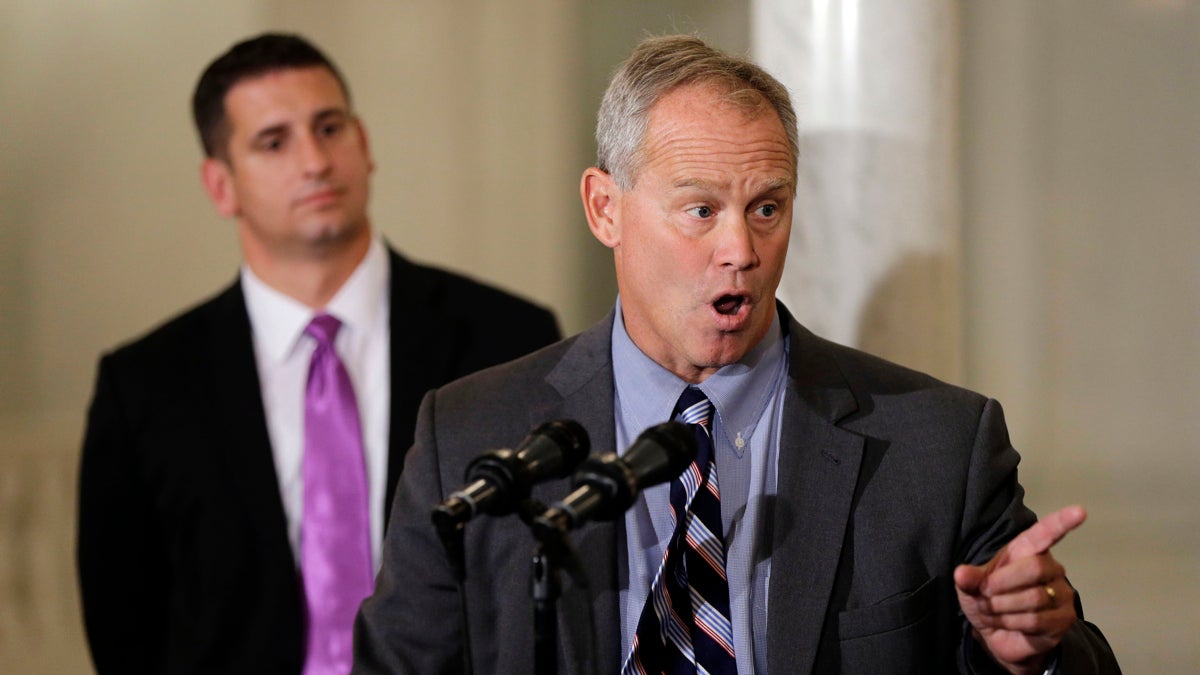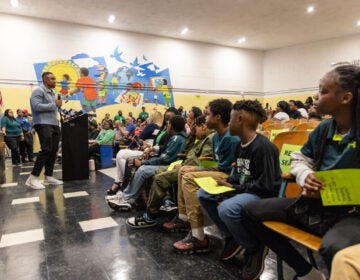After another tentative agreement falters, uncertainty returns to long-overdue Pa. budget

House Majority Leader Dave Reed (left) and House Speaker Mike Turzai said they believed that they could sell the framework to rank-and-file members, but found more opposition than they expected. (AP Photo/Matt Rourke, file)
For the second time in a month, a tentative deal to end Pennsylvania’s five month-long budget impasse has fallen apart.
Gov. Tom Wolf and legislative leaders on both sides of the aisle came to an agreement late last week that would provide an historic $400 million boost to K-12 education funding by broadening the amount of items eligible for sales tax.
Also key to the deal: leaders agreed to allow wine to be sold in supermarkets, and came up with a pension reform compromise that would call on new employees covered by the state pension system — including teachers — to share some of the market risk in their retirement plans. They would enter a hybrid plan that includes both a defined-benefit pension program and a defined contribution 401k-style plan.
The tentative deal, though, came off its wheels over the weekend, when it became clear that House leaders couldn’t sell rank-and-file members on the finer details of the blueprint.
In part, the larger budget negotiations devolved into a debate about haircuts.
“They want to tax haircuts. So if I’m a family that has four kids, I’m now paying taxes on haircuts,” said state Rep. Fred Keller (R-Union).
Included on the tentative list of new items subject to the sales tax are personal services including haircuts, manicures and pedicures.
“Why does state government consistently have an appetite to spend more, and take more of your money?” Keller asked. “I didn’t come down here just to mark time. And this budget, it’s a hill I’m willing to die on. I’ve planted my flag and I’m saying: pay for it some other way.”
Keller is not alone in his displeasure.
On Monday, as the Senate passed a bipartisan spending bill that would deliver a $460 million increase to pre-K through 12 education, the House appropriations committee advanced a much more modest spending plan — akin to one Wolf vetoed in June.
Steve Miskin, spokesman for House Majority Leader Dave Reed (R-Indiana) and House Speaker Mike Turzai (R, Allegheny), said the pair believed that they could sell the framework to rank-and-file members, but found more opposition than they expected.
“If the members are being asked to put up these tax votes, they want something more robust,” said Miskin, of plans to change the pension and liquor systems.
State Rep. Dan Truitt (R-Chester), who favors the slimmed down spending plan, agreed.
“I’m looking for, what are the details of the liquor bill and the pension bill. Are they worth compromising my principles?” said Truitt.
The action by House Republicans drew criticism from education advocates across the state.
“They’re proposing a budget that they know neither the Senate nor the governor will sign off on. So therefore they’re just playing in their own sandbox,” said Donna Cooper, executive director of Public Citizens for Children and Youth, who worked for Ed Rendell when he was governor.
Cooper lamented that districts across the state have been operating without state subsidies all school year, and that many will soon run out of money.
The school districts in Philadelphia and Erie have taken on mountains of debt to cope with the impasse — driving up costy repayment obligations. Some districts have cut programming. Many of the state’s rural districts have dwindled their reserves.
“This obstinance on the part of House Republicans is causing a fiscal crisis at the local government level that is soon going to be unacceptable when children aren’t going to be able to go to school,” said Cooper.
Gov. Wolf had originally proposed $120 million boost for Pre-K spending. The framework agreement settled the figure at $60 million. The bill advanced by House republicans cuts it to a $30 million increase.
“We find the money for the crisis,” said Sharon Easterling, executive director of the Delaware Valley Association for the Education of Young Children. “By keeping the level of services to kids so depressed, they’re just shutting off so much opportunity.”
Some House Republicans, though, are ready to sign-off on the framework agreement.
“I can live with this budget. It’s not a budget I would have written, but it’s not bad,” said State Rep. Kate Harper (R-Montgomery).
Harper emphasized that the tentative sales-tax agreement does not affect child care, nursing homes, home health care, or legal and accounting services.
“I would not be happy if the exemptions that we were taking away included food and other necessities, but they aren’t, and I think people can handle a six percent tax on a hair cut. I just do,” she said.
While much of the focus has centered on House republicans, some House democrats have balked at the framework agreement as well — opposing plans that would threaten the state liquor store jobs and cut pension benefits for state workers.
State Rep. Jim Roebuck (D, Philadelphia) says he doesn’t like either plan, but says he would vote for them in order to secure a large education funding boost that would make up for recessionary cuts made during former Gov. Tom Corbett’s administration.
“The commanding issue is always remedying what we did to the education system in this state, and we have to make that right,” he said.
As House Republicans pursue an alternate path, leaders in the senate republicans have remained committed to the budget framework agreement.
“Is it a perfect budget? No,” said Jenn Kocher, spokeswoman for Majority Leader Jake Corman. “But is it the best we can get in a divided government? Yes.”
Those sentiments were echoed by Senate Democrats.
“There is significant agreement amongst four of the five major actors in this drama, and we need to take this momentum and push this thing across the finish line,” said state Sen. Vincent Hughes (D-Philadelphia), minority chair of the appropriations committee.
In a teleconference Monday, Hughes said the education boost agreed to in the framework would deliver the School District of Philadelphia an additional $101 million in new funding. This would near the annual amount lost by the district since the state, under the leadership of Corbett, cut the line-item that reimburses districts for the added, systemic costs of charter schools.
In addition to the spending plan, the Senate also passed a pension bill Monday.
Senate leaders, though, still have yet to ink the details of a liquor modernization bill.
And although they’ve mapped out exactly how they’d spend the cash, they’ve yet to sign off on a plan for how to raise it.
In the latest framework agreement, the sales tax expansion accomplishes this, but there’s reason to believe this piece could fall away.
In his teleconference, Sen. Hughes again spoke of a possible personal income tax hike, and/or a tax on natural gas drilling.
In a telephone interview, Keller said he expected the conversation to a shift to an increased tobacco tax.
Miskin emphasized that everything remains in flux.
Eighteen days from Christmas, 160 days past the budget deadline, the executive branch held firm to its latest tentative terms.
“The hope is that we move forward with what was agreed to by all parties, and that we have a budget as soon as possible,” said Jeff Sheridan, spokesman for Gov. Wolf. “The nonsense has to end.”
WHYY is your source for fact-based, in-depth journalism and information. As a nonprofit organization, we rely on financial support from readers like you. Please give today.





